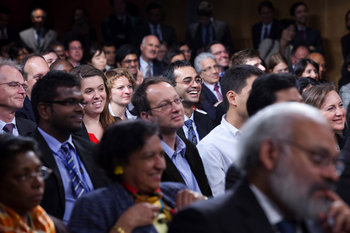
Emotion
Kindnesses, even small kindnesses, can generate positive emotions that cause you to want to repay others. For example, if a neighbor prepares a meal for you after you break your leg -- this may leave you with positive emotions and a desire to pay them back.Mutualism
Mutualism is a mutually beneficial symbiotic relationship that exists between species such as cleaning symbiosis whereby one species eats parasites and other materials from the surface of the other. In some cases, this appears to generate reciprocity. For example, host fish have been observed defending their cleaner fish from predators.Friendship
Friendship is a type of reciprocity whereby people form bonds and support each other.Norms
Norms are social expectations that emerge in a society or culture. These often call for reciprocity. For example, in Japanese culture introductions involve shows of humility that call for each side to return these gestures with cooperation and kindness.Saving Face
Saving face is a norm in some cultures whereby you help others to avoid embarrassment. This is reciprocal such that if you conform to this norm you can expect others to help you save face. For example, an office where it is the norm to use constructive criticism to point out flaws and errors as opposed to insulting, mocking or admonishing others for their failings.Civility
Civility is the practice of resolving differences within the structures and norms provided by society. This often calls for reciprocity. For example, freedom of speech whereby everyone is allowed to express their opinion and everyone is expected to allow others to do the same.Gift Economy
It is a common myth that barter was a historically common type of payment. Rather, commodity money such as rice or shells was commonly used for payments by the earliest societies. A gift economy based on reciprocal gift giving was also an pervasive feature of early civilizations. For example, a farmer with a large harvest might be expected to share their surplus with the community. This farmer could then expect future reciprocal gifts from others in the community such as help to build or fix things. This spirit of sharing in times of surplus can still be seen in many cultures today.Win-win Negotiations
In negotiations, giving up concessions early can lead to favorable terms in the spirit of reciprocity. For example, a car sales person who gives a customer an unexpected credit for returning their leased car with low mileage at the beginning of price negotiations for a new lease.Foot in the Door
Foot in the door is a sales technique whereby a sales person sells something at a good price or on favorable terms in order to establish a relationship with the customer. This can benefit from reciprocity whereby the customer feels compelled to pay for the value they have received. For example, a free trial of a streaming media service whereby most customers will continue to pay after the trial.Service Recovery Paradox
The service recovery paradox is the observation that customers with a complaint can become your most satisfied and loyal customers if the complaint is handled well. A customer may feel a sense of dread that their complaint will be ignored or rebuffed. When a firm takes them at their word and tries to see things from their perspective they may leave the interaction with a sense of gratitude.Petty Reciprocity
Reciprocity can be petty such that it is designed to support character flaws and bad habits. For example, an individual who gets upset when people don't like the photos of their lunch that they post to social media each day may aggressively like the photos of others in hopes of avoiding this tragic rejection in the near future.Conflict Avoidance
Cultures and individuals that are conflict avoiding may heavily rely on reciprocity. For example, a coworker who is always supporting the ideas of others because they feel crushed when people criticize their ideas.Negative Reciprocity
Negative reciprocity is the practice of punishing others equally when you feel you have been wronged. This is problematic as acts such as taking the high road, forgiveness and overcoming negativity are required for civility to prevail. For example, an individual who is constantly trying to retaliate against perceived slights and insults is unlikely to make it far in life as they get pulled into battle with every negative person they happen to meet.Tit for Tat
Tit for tat is a strategy for dealing with an adversary that is aggressive and malicious. It involves replying to each strike by the adversary with a proportional counter strike. This attempts to avoid escalation and tries to demonstrate to the adversary that further conflict will be painful. For example, a nation that responds to tariffs on its products with tariffs of roughly equal value.Reciprocal Altruism
Reciprocal altruism is the act of doing something good because you expect that it will indirectly benefit you in some way. For example, doing good to virtue signal that you are a good person.Abundance Mentality
Abundance mentality is the belief that there is enough for everyone such that the successes of others don't diminish your own success. This term is associated with people of talent and energy who use these resources unselfishly such that they are willing to support and develop those around them. This is unrelated to reciprocity except that abundance mentality often works out well for those how employ it as they end up with a devoted network of people who they have helped.Magnanimity
Magnanimity is greatness of mind and spirit whereby an individual is above petty squabbling but instead works towards some great purpose. People with this characteristic often end up respected, defended and promoted by those around them as they generate goodwill or generally impress others without ever trying.Pay it Forward
Pay it forward is the idea that reciprocity can go to anyone or everyone as opposed to directly to those who have been kind to you. For example, an individual who does good out of a sense of gratitude for their good fortune in life. This would allow reciprocity to flow to those who most need it as opposed to those who have specifically given you something.| Overview: Reciprocity | ||
Type | ||
Definition (1) | A common behavior whereby individuals try to reward the positive behavior of others. | |
Related Concepts | ||





















